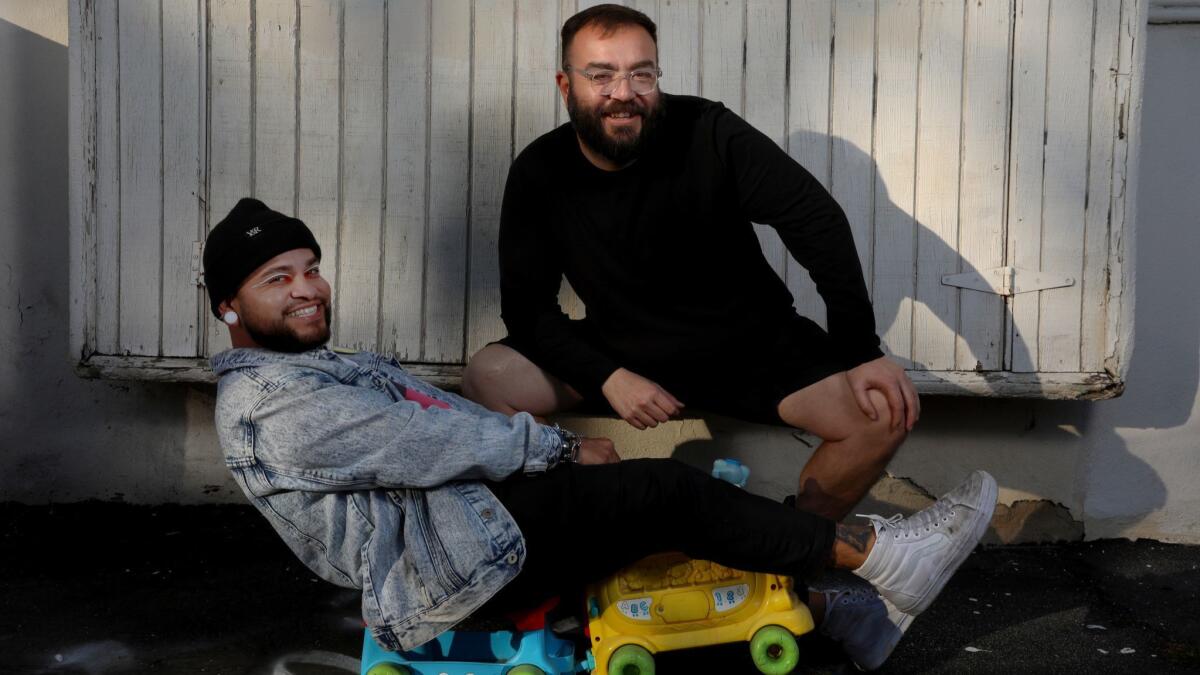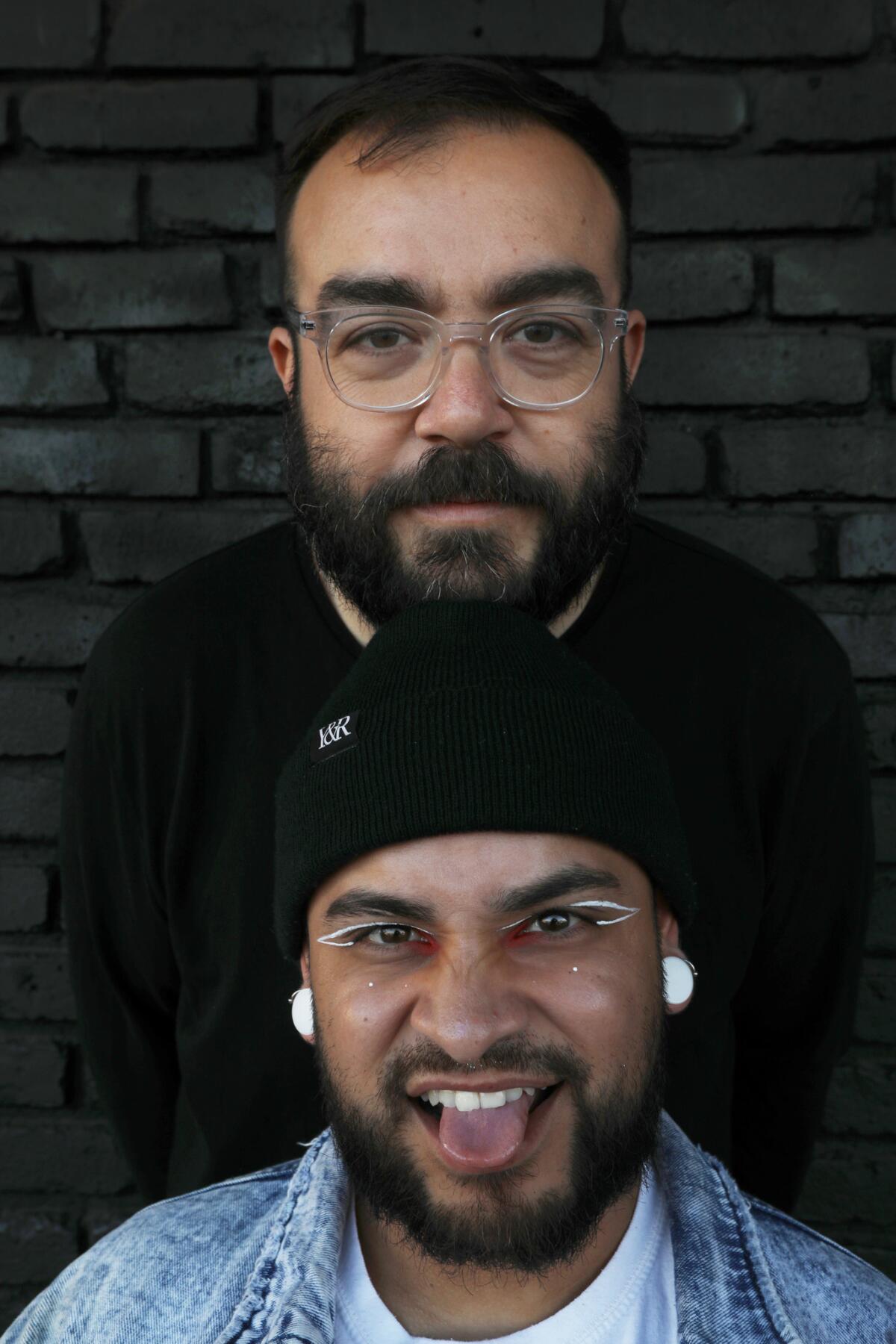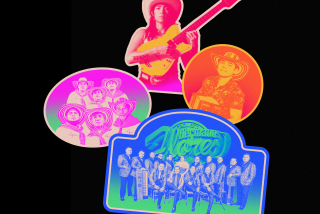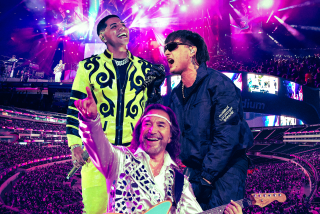Club Scum celebrates three years of championing the LGBTQ Latinx community

- Share via
Even for the often anything-goes, underground Los Angeles punk scene, this night felt unexpected.
Mariachi trio La Victoria had just played traditional Mexican classics by Juan Gabriel, Vicente Fernández and Selena, and drag queens followed with lip-sync performances before longstanding queer punk act Limp Wrist took the stage.
Wigs flew as the drag queens crowd-surfed over the audience, who safely carried them above the circle pit, all while singing in unity: “I love hardcore boys, I love boys hardcore!”
Club Scum on this night last March was celebrating its second anniversary, an evening that once again merged incongruous worlds with cohesive ease. Since its inception in 2016, founders and East L.A. natives Rudy Bleu, 40, and Ray “Hex-Ray” Sanchez, 30, have made it their mission to provide a safe space for punks in the LGBTQ Latinx community.
Club Scum turns 3 this year and began the celebration with a drag pageant Friday at Club Chico, where two performers moved on to battle for the crown Sunday at the Regent in a full-blown party.
The sold-out night will boast a rare appearance from Hunx and His Punx with support from an eclectic mix that includes electronic artist DJ Irene, Mexican rock act Cremalleras and local punks Trap Girl, among others.
Yet the Club Scum experience is beholden to no one sound or genre.
“I’ve always been into house music so being able to have DJ Irene — the lineup is very obscure and sometimes doesn’t make sense, but it has all elements of music and experiences,” Sanchez said.

“As much as Scum is punk, it’s also very heavily Latinx,” Bleu added. “I just think it’s punk in ways that’s not traditional, and we push boundaries as far as performance and the music we play and the DJs we book.”
Bleu and Sanchez have been hosting their inclusive party on the last Friday of every month at Club Chico in Montebello. Both Bleu and Sanchez were already active in the punk community by DJ-ing events, creating DIY zines and organizing shows when they decided to create an event that encompassed their backgrounds and inspirations.
“For us, it was really important that it happen in the Eastside, East L.A. Montebello area, because that’s where we grew up, and the whole point in doing it was that we wanted this party for people in the neighborhood,” Bleu said.
“I was just tired of being in queer punk spaces that were so white,” Bleu continued. “I’d done queer dance parties that were more on the fringes of punk, but they were just so white, and there’s this huge community here that we felt needed representation and the space to gather and create and dance.”
Daniel Lopez Jr., 28, performs as Lady Forbidden and first began to do drag at the age of 16 under the guidance of the late Martin Medrano, otherwise known as Ms. Martin, with the latter’s family, Flawless Victory. (In drag culture, a family is a safe community where queens foster one another under the tutelage of a “mother” figure to compete against other families.)
Lopez frequently collaborates with Bleu and Sanchez at Club Scum by hosting, performing and scouting new talent as well as helping with logistics. Lopez became involved when his partner, 28-year-old Andrew Sanjose, was booked to perform drag under the stage name Fasique. Sanjose invited Lopez, and when they arrived, Bleu asked Lopez to host Club Scum.
“It was honestly one of the best things that’s happened to me,” Lopez said.
Lopez is a longtime veteran of the L.A. drag community, and when not helping with Club Scum, Lopez performs with the DoomHaus drag family.
As a seasoned queen, Lopez said Club Scum differs from the West Hollywood LGBTQ scene by specifically focusing on intersectionality and celebrating people of color.
“The thing that stands out is there is more than four or five brown people in the room … I love going to a dance party and seeing people that look like me, seeing people that make me feel comfortable and accept me for who I am. That is part of the whole Scum experience,” Lopez said.
Moreover, Club Scum aims to include drag styles, performers and identities that don’t fit into stereotypes.
“The performances are really diverse, we do have a lot of the crazier queens who do more extreme numbers, like doing punk songs or industrial stuff, but then we also have traditional queens who will turn out a traditional drag performance,” Bleu said.
“These are queens that are usually rejected in West Hollywood or are not really given any [opportunity] because their drag just doesn’t fit the aesthetic there,” Sanchez said. “People will be like ‘Oh my God gross, she’s spitting blood’ — fake blood. I feel like the performances that we book is like literally watching a punk band. You get that same satisfaction, that same energy.”
Club Scum’s celebration of the anomalous — within a community that is already marginalized — has greatly contributed to its success. The work has resonated beyond the L.A. area and evolved into remote events in New York, Mexico City and San Francisco. A prior pop-up in S.F. was so popular Club Scum was invited to come back and establish a quarterly residency this year.
“The Bay has been really receptive to it, and the first time we did Scum we were both really nervous up there because we were not sure what it was gonna look like, and then it was crazy,” Bleu said. “I remember being almost moved to tears because I just looked at the crowd and I felt like we were at Chico, and it was like, all these cool brown queer kids singing along to songs, and dancing all crazy, and everyone’s sweaty, it just felt like home.”
Ultimately, creating a home and family for misfits is the core value for Club Scum.
“It’s a safe space, it’s a good space, it’s like a family party,” Lopez said. “It’s more intimate. Yeah, we do get new people, but you know everybody, and even if you don’t know them you’re a family. It’s a very touching place.”
More to Read
The biggest entertainment stories
Get our big stories about Hollywood, film, television, music, arts, culture and more right in your inbox as soon as they publish.
You may occasionally receive promotional content from the Los Angeles Times.










